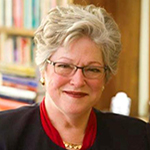By Molly T. Marshall
 Contrary to the many who speak about the church dying, I think it is actually a time of rebirth. We are actually in the process of tossing out some old stuff that wasn’t necessary and finding creative ways to express our identity in the present.
Contrary to the many who speak about the church dying, I think it is actually a time of rebirth. We are actually in the process of tossing out some old stuff that wasn’t necessary and finding creative ways to express our identity in the present.
About two weeks ago, we received news that David Carr, adroit writer for the New York Times, had died. He had a messy relationship with his faith and his church, but he did perceive that “the unconditional love of the Church could possibly mean the difference between somebody living or dying.” I agree. The organic relationships we have in our church are essential for human flourishing.
There is a recent phenomenon in Kansas City. A group of people has formed Oasis, a Sunday morning gathering for community building. It is comprised of atheists, and they have suspended any religious overtones. They are hungry for community, which is the human condition. As N.T. Wright puts it in Simply Christian, “We were made for one another.” I do not know how this experiment will be sustained, but I will be watching. I do know that the church is sustained by the power of God’s Spirit, who fashions disparate people as the Body of Christ and helps us bear the strain of our differences.
When Paul writes the unruly Corinthians who are trying to find a way to be church together, he tells them how intimately they are related to one another. Indeed, he wants the congregation to know that they are resourced beyond the varied gifts some of the members are strutting. Christians are organically related “in Christ,” and none can flourish apart from the whole. “Body of Christ” is Paul’s distinctive description of the church, and Baptists could profit by probing this rich metaphor more deeply.
First Corinthians 12:27 puts it forthrightly: “Now you are the body of Christ, and individually the membranes thereof” (as my teacher John Robinson liked to translate.) Membranes are connective tissue. At times they serve as barriers and filter out what needs removing; membranes constitute organic relations within the body. The interdependence of the body is Paul’s point more than an anatomy lesson; he wants us to know how the risen Christ continues to be present.
Teresa of Avila’s echoes Paul’s teaching:
Christ has no body but yours,
No hands, no feet on earth but yours.
Yours are the eyes with which he looks
Compassion on this world.
Yours are the feet with which he walks to do good.
Yours are the hands, with which he blesses all the world ….
Christ has no body now on earth but yours.
This 16th-century Doctor of the Church well knew that one person could not comprise the Body of Christ. Rather, working together, persons joined to Christ and one another by the Spirit embody his continuing presence.
This is my experience of church; it has been the presence of Christ to me. It has been the most formative influence in my life.
The church is where I learned to love the Bible; I memorized it, studied it and drew guidance from it. I was legendary in sword drill competition at First Baptist Church in Muskogee, Okla., although I cheated on occasion by memorizing the verses.
The church is where I learned to be a Christian. I learned the story of Jesus and chose to follow him at a young age. On my CV I list not only my birth date, but also the date of my baptism.
The church gave me leadership opportunities, and I gained confidence speaking and performing. They drew the line at having a girl preach on youth Sunday, however.
The church introduced me to great music and formed me in practices of worship. Choirs taught interdependence; playing for ensembles taught me responsibility. (I once thwarted the bass who had recently broken up with me by starting in a lower key.)
The church provided models, ordinary saints, who invested their lives in my future. I remember one man bringing black kids to church in the 1970s; it was a profound witness in our segregated culture.
The church helped me dream of Christian vocation, and affirmed my sense of calling to vocational ministry — even if they might not have agreed with the direction it has taken. The church was a place that believed in me yet struggled to understand when I acted upon what I had learned. I simply thought “wherever he leads I’ll go” included me.
The church has recognized my calling and resisted my calling; this has required me to study to “show myself approved” as a careful interpreter of Scripture.
The church has supported me through the hard passages and celebrations of life. When I was terminated at Southern Seminary, it was my church that witnessed my tears and stood with me. In the hard years of my husband’s declining health, faithful friends at church kept finding ways to assist me.
The church has drawn me toward life in Christ and taught me a pathway for a life of service. I am thankful to share in the Body that continues to make Christ present.
